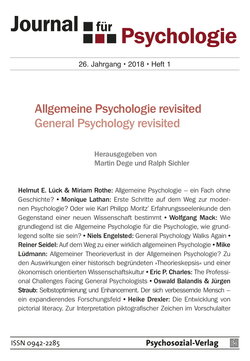Oswald Balandis & Jürgen Straub
Selbstoptimierung und Enhancement (PDF)
Der sich verbesserndeMensch - ein expandierendes Forschungsfeld
Sofortdownload
Dies ist ein E-Book. Unsere E-Books sind mit einem personalisierten Wasserzeichen versehen,
jedoch frei von weiteren technischen Schutzmaßnahmen (»DRM«).
Erfahren Sie hier mehr zu den Datei-Formaten.
Das Bemühen, sich und seine Welt zu verbessern, ist anthropologisch-universal. Gleichwohl sind bestimmte Praxen der (unentwegten) Selbstoptimierung und des Enhancements historische und soziokulturelle Besonderheiten, die ebenso besondere Subjekte mit spezifischen Begehren, Bedürfnissen und Bemühungen hervorbringen. Der Übersichtsbeitrag eröffnet nach detaillierten Begriffsbestimmungen einige kritische Einsichten in exemplarische Praxisund Forschungsfelder, in denen die (teils technisch vermittelte) Optimierung des Selbst im Zentrum steht. Dazu zählen Ernährung, Fitness und Gesundheit, Schönheit, Sexualität und Schlaf, alle möglichen physischen und kognitiven Leistungen, emotionale Fähigkeiten und soziale Kompetenzen (die in psychotherapeutischen beziehungsweise psychotechnischen Behandlungen sowie verwandten Beratungen, Trainings und Coachings fokussiert werden). Das zeitgenössische Optimierungsbegehren begnügt sich nicht mit bloßen Verbesserungen des Althergebrachten. In transoder posthumanistischer Zeit tritt es transgressiv auf und zielt – sei es in technomanischen Entwürfen, sei es in feministischer Perspektive – auf die Cyborgisierung des menschlichen Organismus und die Abschaffung des »antiquierten Menschen«. Selbstoptimierungen reichen mithin von traditionellen Selbstformungen und psychotechnischen Manipulationen über pharmakologische und chirurgische Modifikationen sowie prothetische Ergänzungen und Erweiterungen bis zur gehirnphysiologisch installierten Steuerung des Menschen und schließlich seiner genetischen Transformation in einer ›positiven Eugenik‹ und ›neuen Evolution‹.
Abstract:
Attempts to improve oneself and the world are anthropologically universal. At the same time, certain practices of (continuous) self-optimization and enhancement are historical and socio-cultural particularities which produce particular subjects with particular desires, needs, and efforts. After defining certain terms, this article offers a critical overview and insights into exemplary research and practice fields which center around the (sometimes technologically mediated) self-optimization. Examples are diets, fitness, health, beauty, sexuality, sleep, all kinds of physiological and cognitive achievements, emotional abilities and social competencies (which are focused on in psychotherapeutic and psycho-technological therapies and related consultations, trainings, and coachings). The contemporary desire for optimization is not satisfied with a simple improvement of the traditional. In transand posthuman times, it is transgressive – be it in techno-manic sketches, in a feminist perspective – and aims at a cyborgization of the human body and the end of the antiquated human. Self-optimization reaches from traditional creations of the self to psychotechnological manipulation, pharmacological and chirurgic modification and prosthetic additions/extensions all the way to brain-physiological implementations of control of human beings and eventually genetic transformations in a ›positive eugenics‹ and ›new evolution‹.
Abstract:
Attempts to improve oneself and the world are anthropologically universal. At the same time, certain practices of (continuous) self-optimization and enhancement are historical and socio-cultural particularities which produce particular subjects with particular desires, needs, and efforts. After defining certain terms, this article offers a critical overview and insights into exemplary research and practice fields which center around the (sometimes technologically mediated) self-optimization. Examples are diets, fitness, health, beauty, sexuality, sleep, all kinds of physiological and cognitive achievements, emotional abilities and social competencies (which are focused on in psychotherapeutic and psycho-technological therapies and related consultations, trainings, and coachings). The contemporary desire for optimization is not satisfied with a simple improvement of the traditional. In transand posthuman times, it is transgressive – be it in techno-manic sketches, in a feminist perspective – and aims at a cyborgization of the human body and the end of the antiquated human. Self-optimization reaches from traditional creations of the self to psychotechnological manipulation, pharmacological and chirurgic modification and prosthetic additions/extensions all the way to brain-physiological implementations of control of human beings and eventually genetic transformations in a ›positive eugenics‹ and ›new evolution‹.
Martin Dege & Ralph Sichler S. 3–8Editorial (PDF)
Helmut E. Lück & Miriam Rothe S. 9–29 (PDF)
Monique LathanS. 30–48 (PDF)
Wolfgang MackS. 49–73 (PDF)
Niels EngelstedS. 74–96General Psychology Walks Again (PDF)
Reiner SeidelS. 97–122 (PDF)
Mike LüdmannS. 112–122 (PDF)
Eric P. CharlesS. 123–130The Professional Challenges Facing General Psychologists (PDF)
Oswald Balandis & Jürgen Straub S. 131–155Selbstoptimierung und Enhancement (PDF)
Der sich verbesserndeMensch - ein expandierendes ForschungsfeldHeike DrexlerS. 156–177 (PDF)
Helmut E. Lück & Miriam Rothe S. 9–29 (PDF)
Monique LathanS. 30–48 (PDF)
Wolfgang MackS. 49–73 (PDF)
Niels EngelstedS. 74–96General Psychology Walks Again (PDF)
Reiner SeidelS. 97–122 (PDF)
Mike LüdmannS. 112–122 (PDF)
Eric P. CharlesS. 123–130The Professional Challenges Facing General Psychologists (PDF)
Oswald Balandis & Jürgen Straub S. 131–155Selbstoptimierung und Enhancement (PDF)
Der sich verbesserndeMensch - ein expandierendes ForschungsfeldHeike DrexlerS. 156–177 (PDF)

